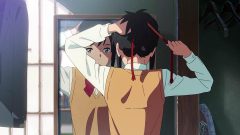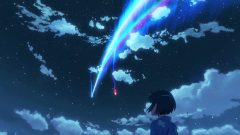As of this writing, Kimi no Na wa, or Your name. has enjoyed a phenomenal commercial and critical success. It becomes the highest grossing film of the year in Japan, and broke many records elsewhere in Thailand, China, America… you name it. Even in the local theatre where I went to, we got a full house screening and even the friend that I took that day who is unfamiliar with anime told me she enjoyed the movie. The film also plays in many festivals around the globe (which is rare for an anime movie let me tell you) and I wouldn’t be surprised if Your name. was nominated for the Academy Awards for best animation in a month time. To say all that means I understand full well the appeals of this movie. This movie took the world by storm and somewhat becomes “a pinnacle” on what anime can achieve, or even to some extend what anime would be like to those who know little about anime beside the works from Ghibli studio. “it’s a matter of time before Makoto Shinkai make a masterpiece and with this he achieved it” I heard you say. Well, Your name. might be the work that he’d be known for throughout his career (I have my doubts that his upcoming movies will be as successful as this), but it doesn’t mean that this is his best, his masterpiece. Allow me to elaborate it in my review below.
Your name. divides sharply into 3 sections with 3 different tones. The first part plays out like a Freaky-Friday style rom-com when our two protagonists, the country girl Mitsuha and high school Tokyo boy Taki, swapped bodies for a day. Those misfits’ situations allow room for many light-heart comedies detailing the two struggle with the body of opposite sex (leading to the hilarious-but-quickly-wear-out gags of Mitsuha grabbing her boobs), with the totally new life and new friends they’re encountering. After few times of behaving like losing their minds, they get on quickly with the switch, enjoy the new life and also write notes to each other to follow up what is happening. The second part is where the drama kicks in and for me this is the movie’s best part. Finally the closing part we return to Shinkai’s favorite territory: a quiet, romantic melodrama that keep building up to the moment where the emotions explode.
Speaking of Makoto Shinkai, there is two things that are signature of his works, namely his gorgeous and detailed scenery (AKA scenery-porn) and his overblown romantic drama. I’m always a fan of his first element, and in this movie it works really well and I could argue this is the most stunning backgrounds in any of his works. The little town of Itomori is vivid in its rural settings, with trees blowing in the wind, people having a quiet, relax life and there are still many traditions going around. Tokyo, on the other hand, is noisy and busy, with kids too busy with their cell phones and part-time job, parents have to rush to work. All those settings are so true-to-life that we can feel and taste the lifestyles in each setting. Even the mysterious landscape that divides the world and the underworld is breathtaking and surprisingly rich.
But his other tendency tends to give me a mixed feeling. For the record, the overblown climax in The Garden of Words for example is its weakest part. The main reason I don’t like those overstated drama is I always sense the movie dictates what I want to FEEL with a capital F, overdone music score and tissue-grabbing moments. In Your name. I have the same issues. Sometimes I just want to say to Shinkai: less is much more. Characters cry for the reason they themselves don’t know. More than once they shout about remembering the name of each other. Too many times they chase each other that while I’m totally fine when they do it once, repeating the heighten drama lose its impact after each time.
This is not the only issues though. I guess the other problem comes from “too much of a good thing”, which often the time original anime movies tend to confront (works from Makoto Shinkai and Mamoru Hosoda are the main suspects), and that problem is the way the try to put many plots going together that frankly it becomes a hot mess. Take the sequence where Mistsuha (the real Mistsuha) starting a new day in the beginning of the movie for example, you can see the movie planted many plot points ahead. When she comes to the table to have breakfast (rice for breakfast? Oh well! you need a healthy body for a full day after all), first obaa-chan reminded her that she’s acting normal today (indicates that Taki was in her position yesterday), then she hears the town announcement of the coming electoral (which links to her father and their tense relationship), then she switches on the TV and we have the comet news (which is essential to the plot point), and then she goes back to her room to tie the braided cords to her hairs (which is also essential to the plot point). As a detailed guy, little details like that should make me happy, but I only feel the movie tries to cram all the information up in order to connect all the dots later on. For once, I don’t really see the plot thread of her father’s a mayor affecting much to the story. Or Taki’s crush to his co-worker (especially not much later her role is changing to sidekick). Lessen those unnecessary plots down could make this movie more focus, and much tighter.
Even with the main theme of Kimi no Na wa, we have too many metaphors and symbols that in some ways they are overlapping the others and again, simplifying into one central symbol will make the movie much stronger. We already have the title about the name, which throughout the movie the main characters struggle to remember the name of each other. That meant to be the fate that their lives already intervened, that even you don’t know about the name or identity of “the one”, they can still feel the presence of that person inside their heart. We also have the symbols of thread cords, which she gave it to him few years ago. Threads also meant the connection the leads have together, and that connection will never be cut down even if they don’t recognize each other in real life. And then we have the notion of “Musubi”, which meant to be the things people consumed and then offering to the Gods to become a connection between the god and the people, between the afterlife and the current life, In order words, between the long lost-Mitsuha and the current Taki. You see, “connection” are the themes and those symbols have their well-meaning but when you put all of them together, it’s confusing and lose its focus. Also the different in tones between the 3 parts makes the movie as a whole inharmonious but for that records they did extremely well on establishing the moods in those separate parts.
Also, while I said earlier that the second part is easily their best part, when you witness the real weight of the drama and an attempt to save the one you loved is nothing but affecting; dealing with time-warp is always a very tricky part. Because when you really question the functionality of the timeline, logic starts to fall apart. You might simply brush it off that the main characters thought the whole experience as their dreams, but can’t they tell the different in timeline when they have to go to school everyday? Or even with 3-year gap Taki still looks the same, wearing the same uniform and doesn’t really have any memory about that girl, but keep on wearing the braided cords instead? Or the very convenient plot point when he tried to show his friends about the memos that the two shared, it vanishes right before his eyes? Those are small details of course but it does bug me and keep me away from enjoying the movie to the fullest.
Sound like I have too much negativity about the movie in this review but the truth is I really enjoyed it. When Your name. is at its best, it can bring out the satisfying emotions like few anime I saw this year. The part where they eventually meet in a twilight landscape is emotionally-affecting and well-earned, and their chemistry with each other is surprisingly strong, consider they don’t actually meet each other that much. The two mains are refreshing and very likeable and I don’t mind spending more time with the two to be honest. The animation is top notch and the music, while overbearing at times, still does its jobs quite fittingly. Other everyday-life parts in the beginning are mundane and lifelike and full of personality as well, if I have to pick my favorite it’d be the sequence where Mitsuha doing the traditional dance with her little sister. Oh and the part that Taki drink the sake down the cave, Shinkai actually experienced with other animation-style and the brief montages towards Mitsuha’s past live (yes! Simple but affective) are simply the movie’s best moments and I really hope Shinkai can begin to experiment more with his own styles.
So back to that main question, is this Shinkai’s best work? No, I don’t think so but I would certainly say it’s his most accessible work and will likely to be the one that he will be famous for the rest of his career. For me with someone as talented as Shinkai, “accessible” isn’t an adjective I’m looking for, since if your work is for everyone, then it is for no one really in particular.






